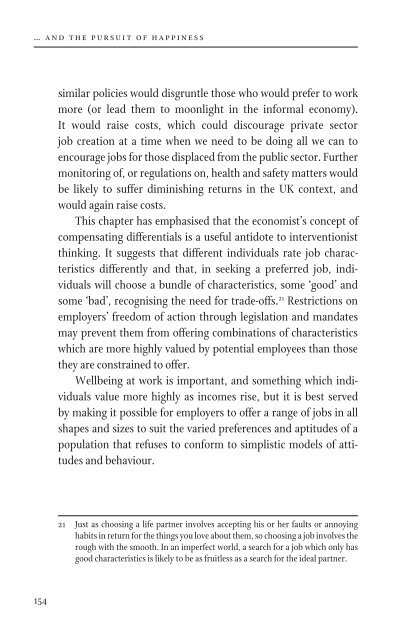… and the Pursuit of Happiness - Institute of Economic Affairs
… and the Pursuit of Happiness - Institute of Economic Affairs
… and the Pursuit of Happiness - Institute of Economic Affairs
Create successful ePaper yourself
Turn your PDF publications into a flip-book with our unique Google optimized e-Paper software.
<strong>…</strong> <strong>and</strong> <strong>the</strong> pursuit <strong>of</strong> happiness<br />
wellbeing at work: any lessons?<br />
similar policies would disgruntle those who would prefer to work<br />
more (or lead <strong>the</strong>m to moonlight in <strong>the</strong> informal economy).<br />
It would raise costs, which could discourage private sector<br />
job creation at a time when we need to be doing all we can to<br />
encourage jobs for those displaced from <strong>the</strong> public sector. Fur<strong>the</strong>r<br />
monitoring <strong>of</strong>, or regulations on, health <strong>and</strong> safety matters would<br />
be likely to suffer diminishing returns in <strong>the</strong> UK context, <strong>and</strong><br />
would again raise costs.<br />
This chapter has emphasised that <strong>the</strong> economist’s concept <strong>of</strong><br />
compensating differentials is a useful antidote to interventionist<br />
thinking. It suggests that different individuals rate job characteristics<br />
differently <strong>and</strong> that, in seeking a preferred job, individuals<br />
will choose a bundle <strong>of</strong> characteristics, some ‘good’ <strong>and</strong><br />
some ‘bad’, recognising <strong>the</strong> need for trade-<strong>of</strong>fs. 21 Restrictions on<br />
employers’ freedom <strong>of</strong> action through legislation <strong>and</strong> m<strong>and</strong>ates<br />
may prevent <strong>the</strong>m from <strong>of</strong>fering combinations <strong>of</strong> characteristics<br />
which are more highly valued by potential employees than those<br />
<strong>the</strong>y are constrained to <strong>of</strong>fer.<br />
Wellbeing at work is important, <strong>and</strong> something which individuals<br />
value more highly as incomes rise, but it is best served<br />
by making it possible for employers to <strong>of</strong>fer a range <strong>of</strong> jobs in all<br />
shapes <strong>and</strong> sizes to suit <strong>the</strong> varied preferences <strong>and</strong> aptitudes <strong>of</strong> a<br />
population that refuses to conform to simplistic models <strong>of</strong> attitudes<br />
<strong>and</strong> behaviour.<br />
21 Just as choosing a life partner involves accepting his or her faults or annoying<br />
habits in return for <strong>the</strong> things you love about <strong>the</strong>m, so choosing a job involves <strong>the</strong><br />
rough with <strong>the</strong> smooth. In an imperfect world, a search for a job which only has<br />
good characteristics is likely to be as fruitless as a search for <strong>the</strong> ideal partner.<br />
References<br />
Blanchflower, D. G. <strong>and</strong> A. J. Oswald (2005), ‘<strong>Happiness</strong> <strong>and</strong><br />
<strong>the</strong> Human Development Index: <strong>the</strong> paradox <strong>of</strong> Australia’,<br />
Australian <strong>Economic</strong> Review, 38(3): 307–18.<br />
Böckerman, P., P. Ilmakunnas <strong>and</strong> E. Johansson (2010), ‘Job<br />
security <strong>and</strong> employee well-being: evidence from matched<br />
survey <strong>and</strong> register data’, Labour <strong>Institute</strong> for <strong>Economic</strong><br />
Research (Finl<strong>and</strong>) Discussion Paper 262, http://mpra.<br />
ub.uni-muenchen.de/21961/.<br />
Brinkley, I., R. Fauth, M. Mahdon <strong>and</strong> S. Theodoropoulou<br />
(2010), ‘Is knowledge work better for us? Knowledge workers,<br />
good work <strong>and</strong> wellbeing’, London: The Work Foundation.<br />
Brown, A., A. Charlwood, C. Forde <strong>and</strong> D. Spencer (2006),<br />
‘Changing job quality in Great Britain 1998–2004’,<br />
Employment Relations Research Series 70, Department <strong>of</strong><br />
Trade <strong>and</strong> Industry, December.<br />
Brown, A., C. Forde, D. Spencer <strong>and</strong> A. Charlwood (2008),<br />
‘Changes in human resource management <strong>and</strong> job<br />
satisfaction 1998–2004: evidence from <strong>the</strong> Workplace<br />
Employment Relations Survey’, Human Resource Management<br />
Journal, 18(3): 237–56.<br />
Brown, G. D., J. Gardner, A. J. Oswald <strong>and</strong> J. Qian (2008), ‘Does<br />
wage rank affect employees’ well-being?’, Industrial Relations,<br />
47(3): 355–89.<br />
CIPD (2007), What’s happening with well-being at work?, London:<br />
Chartered <strong>Institute</strong> <strong>of</strong> Personnel <strong>and</strong> Development.<br />
Clark, A. E. (2009), ‘Work, jobs <strong>and</strong> well-being across <strong>the</strong><br />
millennium’, IZA Discussion Paper 3940, January.<br />
154 155












